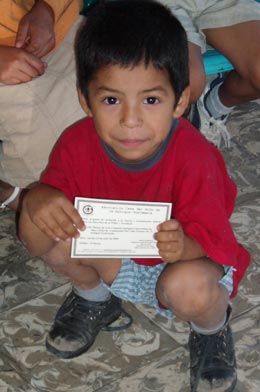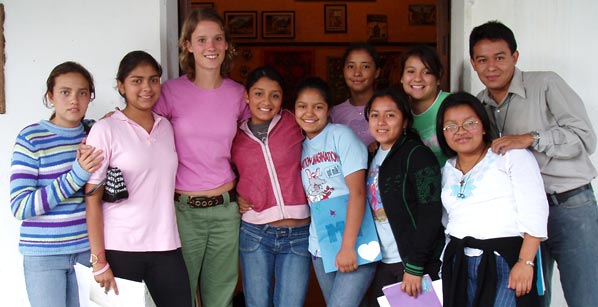
A child from the local orphanage holding his invitation to the Conference on the Rights of Children and Youth |
Casa del Niño (CANI) (Antigua, Guatemala)
Since May 16th I have been working at Casa del Niño (CANI), in Antigua, Guatemala, a locally-run, non-profit NGO. The goal of the organization is to improve the lives of disadvantaged children through education, sports, culture and health. To do this, CANI runs a dental clinic (for poor children), offers English and art classes, and runs a non-profit store which sells crafts from local artisans to fund its projects.
My first project with CANI was to organize and teach free English classes to a group of girls who come from broken homes and/or orphanages. I work with these teenagers two days a week, and taught them a unit on Guatemalan laws relating to children's rights, International Human Rights and the United Nations.
To further the aims of the project, I have made myself useful by decorating the classroom, translating documents from Spanish to English and writing the English version of their web-site. As the organization has no other English-speaking employees, they had little-to-no promotional material in English and barely any in Spanish either. One of the main problems I see in CANI is a lack of funding. To increase the chances of international funding, part of my job has been writing a brochure in English (and Spanish), taking photos and otherwise documenting the work of the organization and planning events which serve both to market the organization and further its goals.
In order to achieve this end, I have been planning and coordinating a Conference on the Rights of Children and Youth. I have been cooperating with Casa Alianza and the local Human Rights Office (Procuraduria de Derechos Humanos). Both organizations are sending speakers to the Conference, and my English students have written two plays about human rights abuses in Guatemala to be performed at the Conference as well. The Conference is aimed at local children and we have invited children from local orphanages, outreach programs working with street children and elementary schools to attend.
Alongside these projects I have been directing the work of another volunteer, looking for other volunteers for the organization (including dentists), helping set up a computer system (including Internet!) and writing a report on possible donor organizations.
Teaching the English classes and organizing the Conference on Children's Rights have been very rewarding projects. I enjoy the direct contact and interaction with local children. While planning the conference has at times been challenging to the point of frustration (what with working in a second-language, realizing at the last minute that there is not enough money to pay for chairs, etc.) I'm hopeful it will all come off okay.
Overall, my time here thus far has covered the range from initial confusion through to eventually finding my niche in the organization and making good connections with my coworkers and students. Aside from enjoying the stunning scenery, cultural richness and irresistible warmth of the people of this country, I have also learned that working abroad is full of surprises. Thanks for giving me the opportunity to experience human rights work firsthand.

IHRP intern Sarah McEachern with her English students and the director of the project, outside the Casa del Niño office


